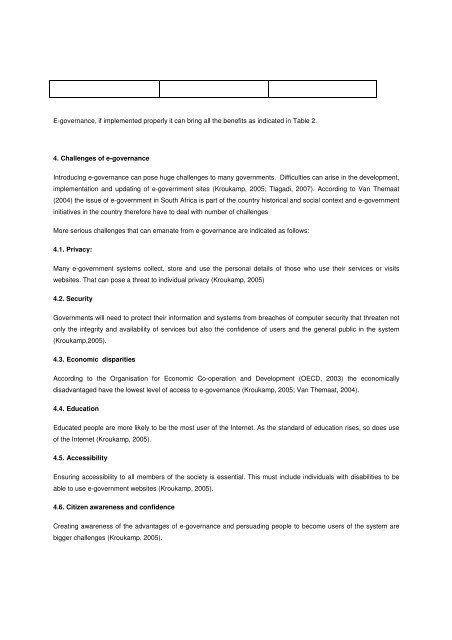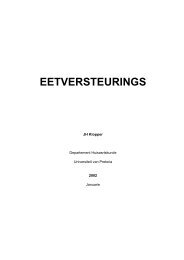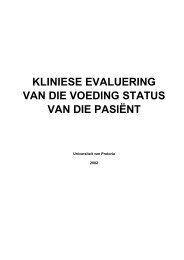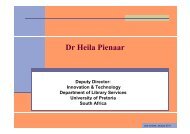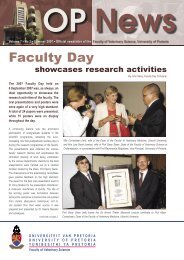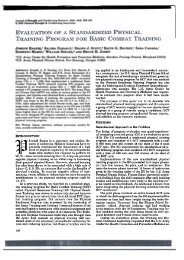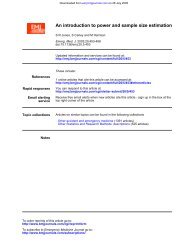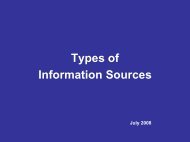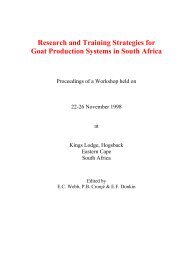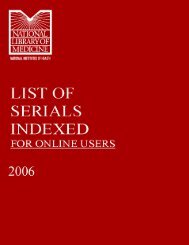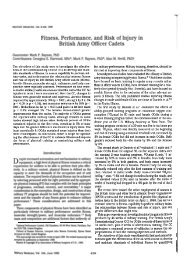Digital divide and e-governance in South Africa - Library
Digital divide and e-governance in South Africa - Library
Digital divide and e-governance in South Africa - Library
Create successful ePaper yourself
Turn your PDF publications into a flip-book with our unique Google optimized e-Paper software.
E-<strong>governance</strong>, if implemented properly it can br<strong>in</strong>g all the benefits as <strong>in</strong>dicated <strong>in</strong> Table 2.<br />
4. Challenges of e-<strong>governance</strong><br />
Introduc<strong>in</strong>g e-<strong>governance</strong> can pose huge challenges to many governments. Difficulties can arise <strong>in</strong> the development,<br />
implementation <strong>and</strong> updat<strong>in</strong>g of e-government sites (Kroukamp, 2005; Tlagadi, 2007). Accord<strong>in</strong>g to Van Themaat<br />
(2004) the issue of e-government <strong>in</strong> <strong>South</strong> <strong>Africa</strong> is part of the country historical <strong>and</strong> social context <strong>and</strong> e-government<br />
<strong>in</strong>itiatives <strong>in</strong> the country therefore have to deal with number of challenges<br />
More serious challenges that can emanate from e-<strong>governance</strong> are <strong>in</strong>dicated as follows:<br />
4.1. Privacy:<br />
Many e-government systems collect, store <strong>and</strong> use the personal details of those who use their services or visits<br />
websites. That can pose a threat to <strong>in</strong>dividual privacy (Kroukamp, 2005)<br />
4.2. Security<br />
Governments will need to protect their <strong>in</strong>formation <strong>and</strong> systems from breaches of computer security that threaten not<br />
only the <strong>in</strong>tegrity <strong>and</strong> availability of services but also the confidence of users <strong>and</strong> the general public <strong>in</strong> the system<br />
(Kroukamp,2005).<br />
4.3. Economic disparities<br />
Accord<strong>in</strong>g to the Organisation for Economic Co-operation <strong>and</strong> Development (OECD, 2003) the economically<br />
disadvantaged have the lowest level of access to e-<strong>governance</strong> (Kroukamp, 2005; Van Themaat, 2004).<br />
4.4. Education<br />
Educated people are more likely to be the most user of the Internet. As the st<strong>and</strong>ard of education rises, so does use<br />
of the Internet (Kroukamp, 2005).<br />
4.5. Accessibility<br />
Ensur<strong>in</strong>g accessibility to all members of the society is essential. This must <strong>in</strong>clude <strong>in</strong>dividuals with disabilities to be<br />
able to use e-government websites (Kroukamp, 2005).<br />
4.6. Citizen awareness <strong>and</strong> confidence<br />
Creat<strong>in</strong>g awareness of the advantages of e-<strong>governance</strong> <strong>and</strong> persuad<strong>in</strong>g people to become users of the system are<br />
bigger challenges (Kroukamp, 2005).


